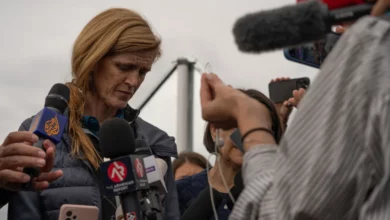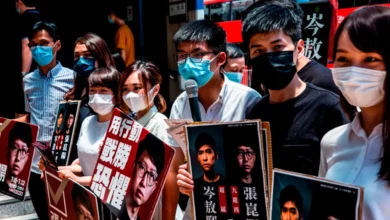The United States must deploy more resources to adequately support democracy and human rights around the world, Freedom House, a democracy grant-maker, said in a statement last Friday.
“Under the Obama Administration, the US government acquiesced to demands from Egypt and Bolivia to eliminate all funding for independent civil society,” said the statement, which also condemns the fact that assistance reaches those groups that have been approved by the Egyptian government.
The cuts in US democracy funding for Egypt have been widely perceived as an act ripe with political messages rather than negative financial impact. Those messages are defining the Obama administration’s relation with Egypt, two years after the US president took power.
“The problem is not financial. The problem is in the political message behind this decision,” Bahey Eddin Hassan, director of the Cairo Institute for Human Rights Studies told Al-Masry Al-Youm. “This decision means direct support for the ruling regime in Egypt.”
According to the US Embassy in Egypt, US bilateral assistance in the 2009 fiscal year was reduced from $415 million to $200 million, of which $5 million are allocated to civil society organizations. Additional funding for civil society is granted through other sources such as the Middle East Partnership Initiative and the State Department’s Bureau of Democracy, Human Rights and Labor. According the 2009 USAID audit report, democracy and governance aid started increasing since 2005 and reached $55 million in 2008. NGOs started benefiting in 2005 from a direct grants program, whereby they received USAID’s support directly.
According to Hassan, the budget cuts and the decision to give the Egyptian government the right to decide which NGOs receive funding is not new. “This is the second year that such decisions have been passed. Last year, we thought it might be a left-over policy from the Bush administration. But the continued funding cuts make it clear that this is an Obama policy.”
Law 84/2002 stipulates that the Ministry of Social Solidarity must endorse any external funding received by registered NGOs. For Hassan, the US move granting the Egyptian government veto power over local organizations receiving funds legitimizes the state’s on-going day-to-day intervention in NGOs’ work. “The effect may extend to other governments in the region which will follow the Egyptian interventionist model in dealing with NGOs,” he says.
“We are disappointed by cuts, especially for Egypt,” Daniel Calingaert, deputy director of programs at Freedom House, told Al-Masry Al-Youm in a phone interview from Washington D.C. “But we are still hopeful. We’d like to see Obama’s pronounced principles being implemented. It does not take only funding, but also diplomatic engagement.”
According to the Freedom House statement, the Obama administration requested $3.3 billion for democracy assistance in the 2011 budget. This request represents a 25 percent increase over last year, but will be allocated mostly to Afghanistan, which receives 40 percent of overall US democracy and human rights assistance. The democracy fund request amounts to one-tenth of one percent of the total budget request.
“Although Afghanistan and Pakistan are undoubtedly a priority, past experience demonstrates that large infusions of assistance will not be utilized effectively,” said Jennifer Windsor, Executive Director of Freedom House, in the statement. “In the budget negotiation process, countries that are in the “vulnerable middle” but not on the front-pages get squeezed.”
For Freedom House, the impact of those policies will not affect its work proper, but rather the work of civil society organizations that it supports in Egypt. “The real issue at stake is the presence of an independent vibrant civil society. If the government has the power to decide who gets support and from where, then there is no independence,” says Calingaert.
For Calingaert, government control over aid recipients is “one factor among others in a situation that is very restrictive.” He says that while aid supports programs to enhance voter participation and to combat electoral fraud, the emergency law remains a predominant obstacle to their work.
But Hassan doesn’t see civil society being compromised given the limited scope of beneficiary NGOs. “There are many alternative sources of funding. At all rates, the majority of democracy aid goes to state-affiliated institutions or organizations registered under the NGOs’ law but their agenda is supportive of the regime,” Hassan adds, highlighting the funding cuts are not that significant to the proliferation of democracy.
According to Calingaert, Freedom House works with more than 30 NGOs in Egypt, which cover a wide range of issues, from voters’ registration, to women’s rights, to electoral supervision, among others. The organization was founded in 1941 as reaction to Nazism. At the time it was supportive of the Marshall Plan, the US pledge to rebuild the economies of Western Europe, and the establishment of the North Atlantic Treaty Organization (NATO).




